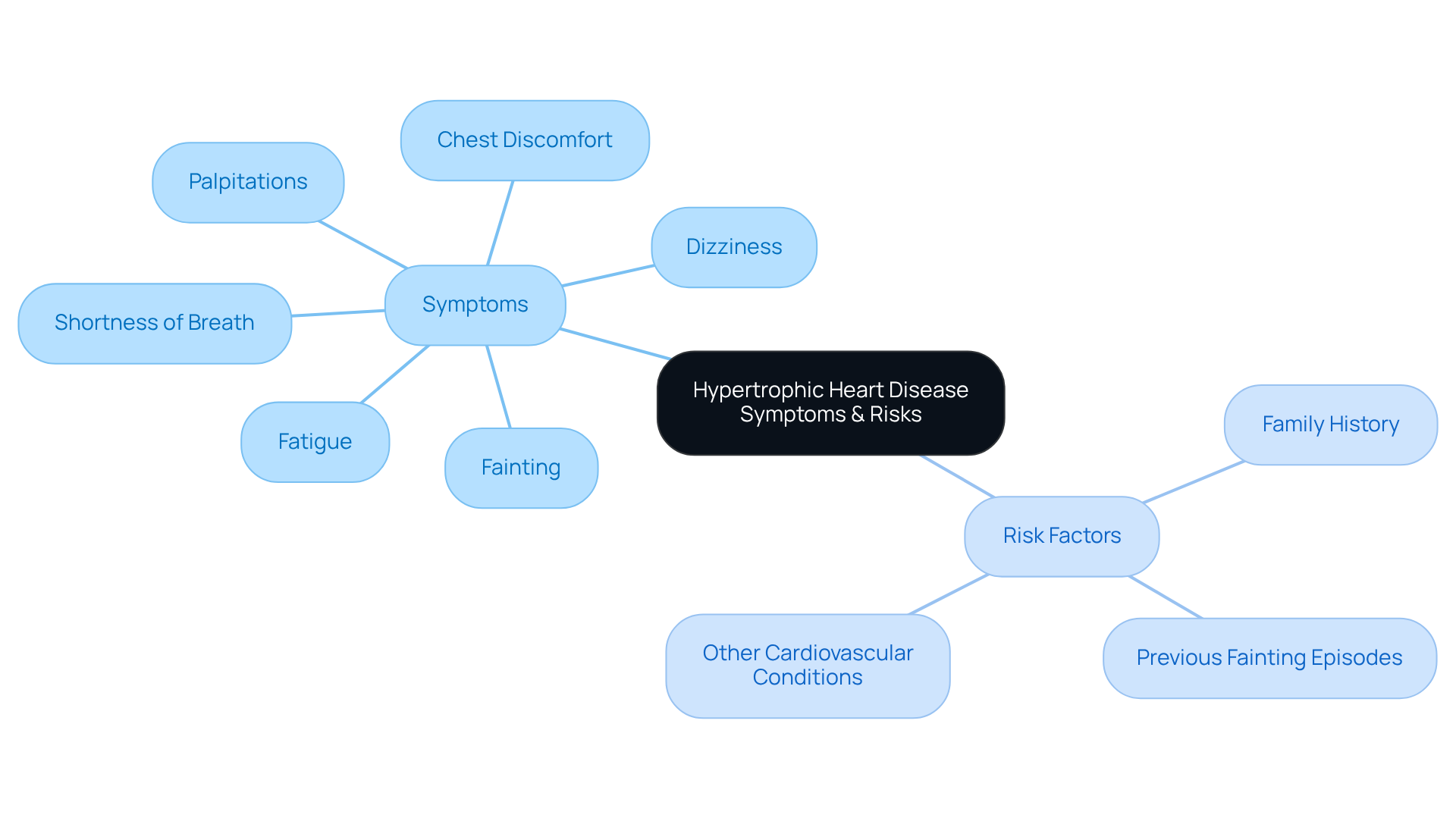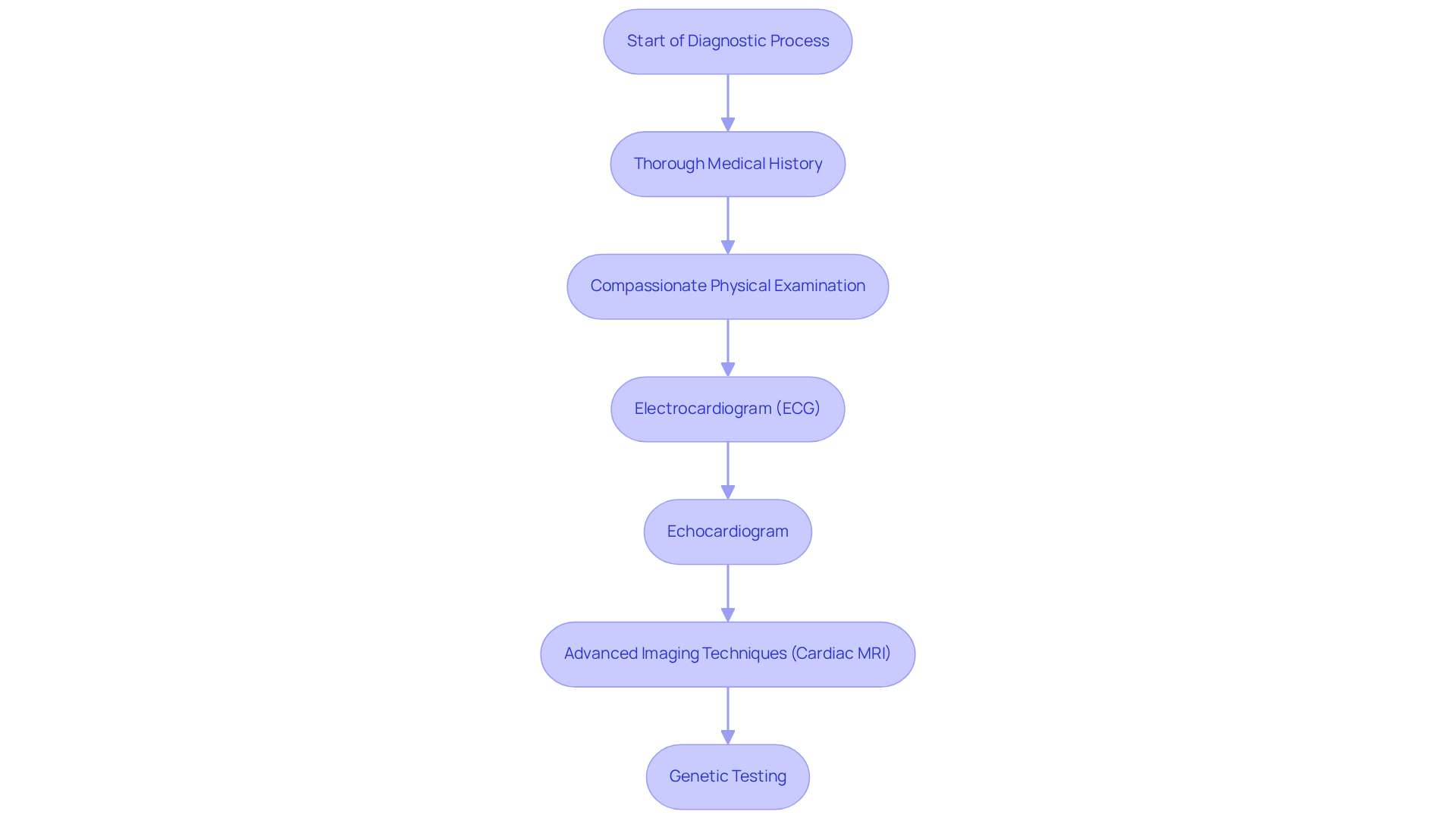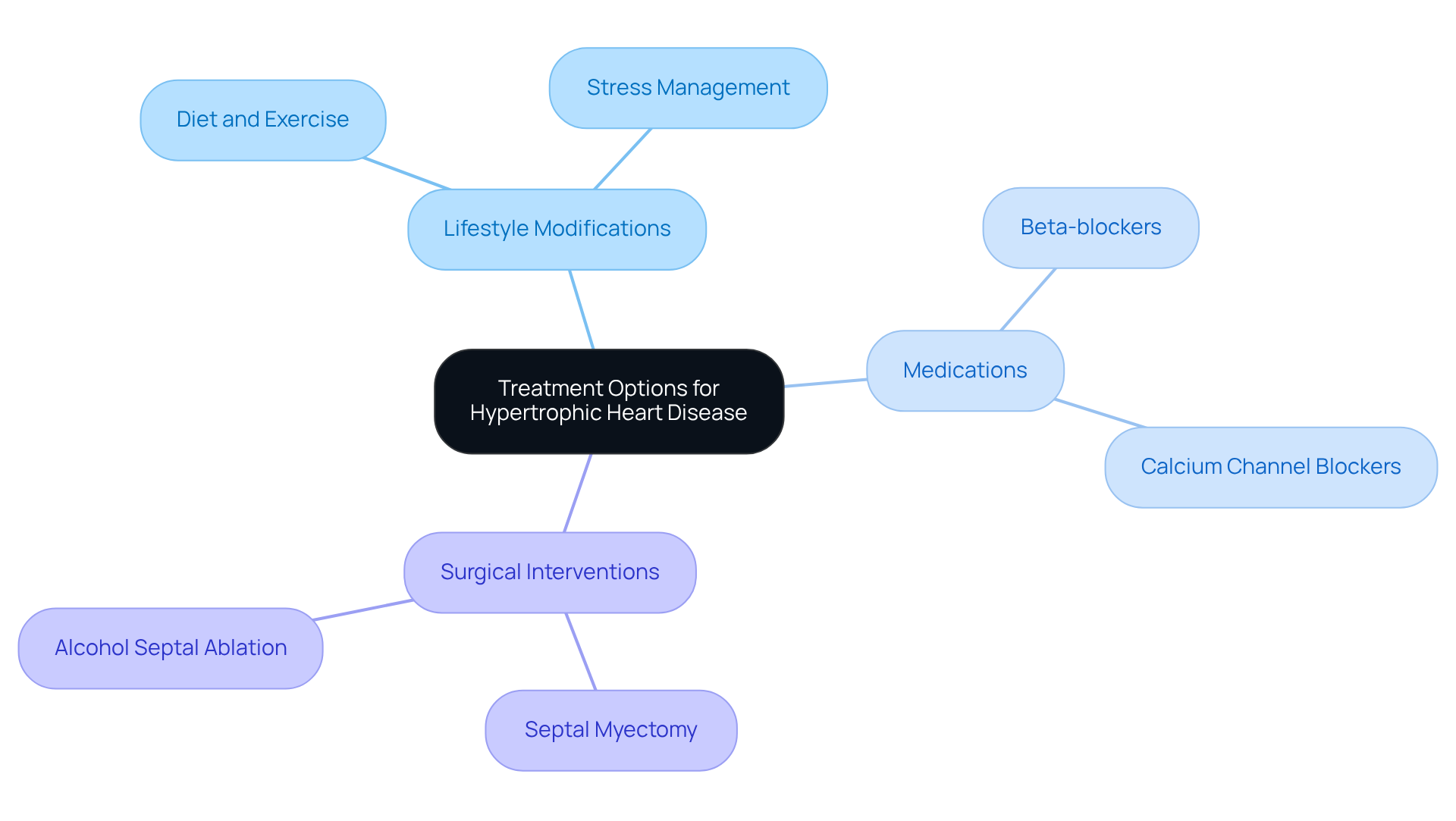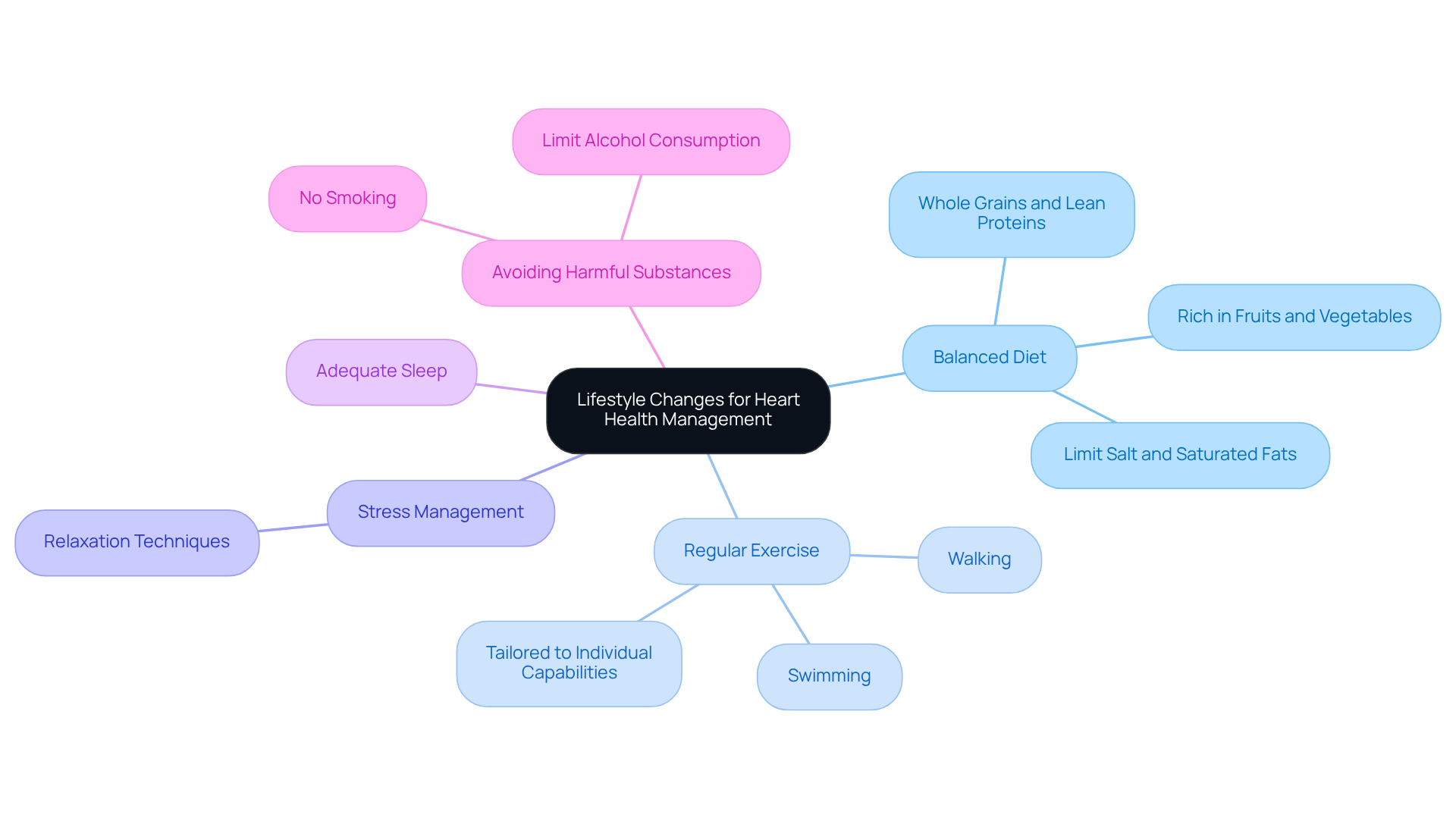


This article highlights five essential steps for managing hypertrophic heart disease (HCM) in seniors. The journey begins with understanding this condition, which is vital for anyone affected. Next, identifying symptoms and risks allows for early intervention, fostering a sense of control and reassurance. Navigating the diagnostic process can feel daunting, but it’s an important step toward clarity and care. Exploring treatment options opens doors to various paths for health improvement, while implementing lifestyle changes can significantly enhance well-being. Each of these steps underscores the importance of proactive health management, regular monitoring, and collaboration with healthcare providers. Together, we can work to improve outcomes and enrich the quality of life for seniors impacted by this hereditary condition. Remember, you are not alone on this journey; support is available, and every step taken is a step towards a healthier future.
Hypertrophic cardiomyopathy (HCM) is a complex condition that presents unique challenges, especially for seniors whose heart health may already be compromised. This hereditary disease, characterized by the thickening of heart muscle, can lead to serious complications if not managed effectively. Understanding the nuances of HCM is essential for older adults, as proactive management can significantly improve quality of life and reduce health risks.
Navigating the diagnostic and treatment landscape can feel daunting. What are the most effective strategies for managing this condition and ensuring optimal heart health as one ages? By addressing these concerns with compassion and care, we can explore the options available to support you on this journey. Remember, you are not alone in this; there are resources and strategies that can help you maintain your heart health and enhance your well-being.
, also known as hypertrophic cardiomyopathy (HCM), is a hereditary condition that can deeply affect your . Hypertrophic heart disease involves the thickening of the muscle tissue, especially in the left ventricle, which can obstruct blood flow and lead to serious complications like and . Understanding hypertrophic heart disease is particularly important for seniors, as its symptoms may become more pronounced with age. You might be wondering how this condition could impact your life. Regular monitoring and awareness can truly make a difference in managing this condition effectively.
Hypertrophic heart disease is often passed down through generations, which means it can appear at any age. However, many older adults may notice more evident signs of hypertrophic heart disease as they age. It’s natural to feel concerned about these changes. By being aware of the symptoms and seeking regular check-ups, you can take proactive steps towards . Remember, you are not alone in this journey—support and resources are available to help you navigate your health concerns.
If you or a loved one are experiencing symptoms related to hypertrophic heart disease, please consider reaching out to a . They can provide the guidance and support you need to manage this condition effectively. Your heart health is important, and taking action can lead to and peace of mind.

If you or a loved one are experiencing symptoms such as shortness of breath, chest discomfort, dizziness, or fainting—especially during physical activity—it’s important to take these signs seriously. Seniors may also notice feelings of fatigue and palpitations. Understanding the risk factors for complications related to can be crucial; these include:
We encourage seniors to and share any changes with their healthcare provider.
At Amavita Heart and Vascular Health, we offer and comprehensive evaluations designed to provide high-risk patients with . Early intervention can make a significant difference in improving your quality of life and reducing the risk of severe outcomes. Remember, you are not alone—, and we are here to help you navigate your health journey.

The diagnostic process for hypertrophic cardiomyopathy (HCM) often begins with a thorough medical history and a compassionate physical examination. At , our dedicated healthcare providers may perform an electrocardiogram (ECG) to assess your heart's rhythm and an echocardiogram to visualize its structure and function. In addition to this, advanced imaging techniques, such as , and genetic testing might be recommended to confirm the diagnosis and evaluate the severity of your condition.
Our is designed to ensure that seniors like you receive tailored interventions to significantly reduce the risk of . As you prepare for these appointments, we encourage you to record any concerns, medications, and your family history of cardiovascular conditions. This information can greatly assist us in achieving a precise diagnosis and creating that cater to your unique needs. Remember, you are not alone in this journey; we are here to support you every step of the way.

When it comes to managing , it's essential to consider a range of that cater to the unique needs of elderly patients in . Lifestyle modifications, medications, and can all play a vital role in this journey toward better health. Medications like beta-blockers and calcium channel blockers are often prescribed to help manage symptoms and lower the risk of complications, providing a sense of relief and security.
, such as echocardiograms and cardiac MRI, are invaluable in assisting s at Amavita. These tools offer detailed insights into cardiac function and structure, helping to identify the most effective treatment strategies tailored specifically for each patient. In some circumstances, surgical options like septal myectomy or alcohol septal ablation may be considered to relieve obstruction, ensuring that patients have access to comprehensive care.
Given the concerning statistics surrounding cardiovascular health in skilled nursing facilities, it’s crucial for seniors to collaborate closely with their healthcare team. Together, they can develop a that not only addresses individual health needs and lifestyle but also enhances overall cardiovascular care. This partnership can significantly reduce the likelihood of hospital readmissions, fostering a supportive environment where patients feel valued and understood. Remember, you are not alone in this; your healthcare team is here to help you every step of the way.

Seniors can manage HCM more effectively by embracing , supported by the available at Amavita. These lifestyle changes include:
At Amavita, high-risk patients receive and , ensuring that their heart health is monitored effectively. Regular check-ups with healthcare providers will help adjust management strategies as needed, integrating sophisticated tests into a . Remember, you are not alone in this journey; we are here to support you every step of the way.

Hypertrophic heart disease, especially hypertrophic cardiomyopathy (HCM), presents significant challenges for seniors, making a proactive approach to management essential. It’s important to understand this condition, recognize its symptoms, and navigate the diagnostic and treatment processes to maintain heart health. By prioritizing awareness and regular check-ups, individuals can take meaningful strides in managing their cardiovascular well-being.
In this guide, we have outlined key strategies for managing hypertrophic heart disease:
Each step emphasizes the importance of tailored care. Lifestyle changes, such as adopting a heart-healthy diet and engaging in regular exercise, empower seniors to take control of their health, supported by healthcare professionals who are dedicated to their journey.
The importance of managing hypertrophic cardiomyopathy cannot be overstated. It is vital for seniors to actively engage with their healthcare providers, seek support, and make informed decisions about their lifestyle choices. By doing so, they can enhance their quality of life and reduce the risks associated with this condition. Embracing these steps can lead to a healthier heart and a more fulfilling life, reinforcing the message that proactive management is key to effectively navigating hypertrophic heart disease.
What is hypertrophic cardiomyopathy (HCM)?
Hypertrophic cardiomyopathy (HCM) is a hereditary condition characterized by the thickening of the heart muscle, particularly in the left ventricle, which can obstruct blood flow and lead to serious complications such as heart failure and arrhythmias.
Who is most affected by hypertrophic cardiomyopathy?
While hypertrophic cardiomyopathy can affect individuals of any age, its symptoms may become more pronounced in seniors, making awareness and regular monitoring particularly important for older adults.
What are the common symptoms of hypertrophic cardiomyopathy?
Common symptoms include shortness of breath, chest discomfort, dizziness, fainting (especially during physical activity), fatigue, and palpitations.
What risk factors are associated with hypertrophic cardiomyopathy?
Risk factors include a family history of the disease, previous fainting episodes, and other cardiovascular conditions.
What should individuals do if they experience symptoms related to hypertrophic cardiomyopathy?
Individuals experiencing symptoms should reach out to a healthcare professional for guidance and support in managing the condition effectively.
How can early intervention impact the management of hypertrophic cardiomyopathy?
Early intervention can significantly improve quality of life and reduce the risk of severe outcomes related to hypertrophic cardiomyopathy.
What resources are available for those concerned about hypertrophic cardiomyopathy?
Support and resources, including advanced imaging capabilities and comprehensive evaluations, are available through healthcare providers like Amavita Heart and Vascular Health to help navigate health concerns related to hypertrophic cardiomyopathy.